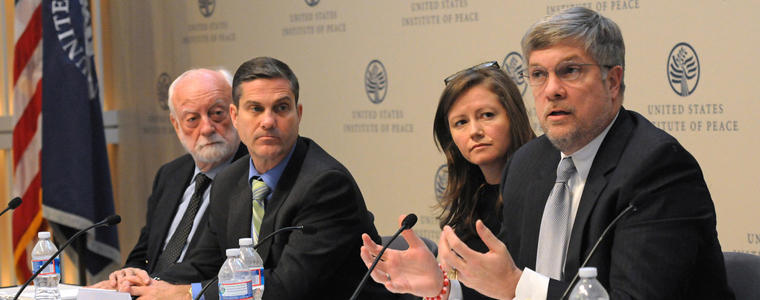Elections, Reconciliation, and the Final Two Years of Afghanistan’s Transition: Perspectives from the International Community
The main elements of the political transition in Afghanistan are the 2014 presidential elections and the attempt to forge a political reconciliation with the Taliban. These issues are interrelated. Some say that there can be no effective elections unless a reconciliation process can first ensure adequate security conditions. Others say that reconciliation is impossible until there is a newly elected government in Kabul. USIP hosted experts from across the international community for two panel discussions examining the uncertainties and complexities of the Afghan election and reconciliation processes.
Read the event coverage, Credible Afghan Elections Seen Critical to Future Stability, Donor Backing

As the clock winds down on the final two years of Afghanistan's security transition, where does the accompanying political transition stand?
The main elements of the political transition are the 2014 presidential elections and the attempt to forge a political reconciliation with the Taliban. These issues are interrelated. some say that there can be no effective elections unless a reconciliation process can first ensure adequate security conditions. Others say that reconciliation is impossible until there is a newly elected government in Kabul.
Both processes are affected by Afghanistan's many uncertainties. Yet some recent developments have settled some questions and opened new opportunities. The re-election of President Obama has settled the question of who is responsible for US policy. The recent release of Taliban leaders by Pakistan could indicate a willingness on the part of Islamabad to play a more active role in supporting a negotiation. The appointment of Salahuddin Rabbani as the Chairman of the High Peace Council may yield greater progress in talks with the armed opposition. The setting of the election date by the Independent Election Commission fulfilled a longstanding demand by the political opposition, but also raised questions about the feasibility of holding elections.
The press of time will force the international community to take a number of positions on a number of complex issues in Afghanistan. USIP hosted two panels that looked at both processes of the political transition.
Speakers
- Welcoming Remarks: Jim Marshall, President, United States Institute of Peace
- Steve Coll, President, New America Foundation; author of Ghost Wars: The Secret History of the CIA, Afghanistan, and Bin Laden, from the Soviet Invasion to September 10, 2001
- Jim DeHart, Director, Office for Afghanistan, Department of State
- Christopher Kolenda, Senior Advisor on Afghanistan and Pakistan, Department of Defense
- Thomas Lynch, Distinguished Research Fellow for Near East and South Asia, Institute for National Strategic Studies, National Defense University
- Clare Lockhart, Founder, Institute for State Effectiveness; author of Fixing Failed States: A Framework for Rebuilding the Fractured World
- Thomas Ruttig, Founder and Senior Analyst, Afghanistan Analysts Network
- Francesc Vendrell, former Special Envoy of the UN Secretary-General to Afghanistan and former European Union Special Representative to Afghanistan; Adjunct Professor at SAIS, Johns Hopkins
- Scott Worden, Senior Policy Advisor, Office of Afghanistan and Pakistan Affairs, United States Agency for International Development
Moderators
- Scott Smith, Deputy Director for Afghanistan Programs, United States Insitute of Peace
- Andrew Wilder, Director of Afghanistan and Pakistan Programs, United States Institute of Peace



